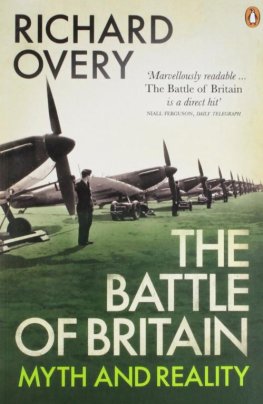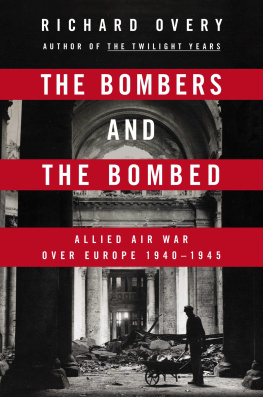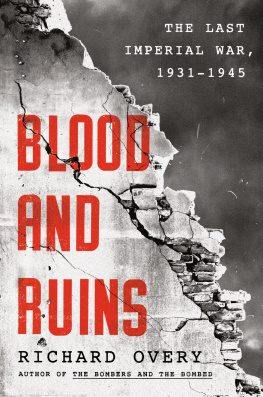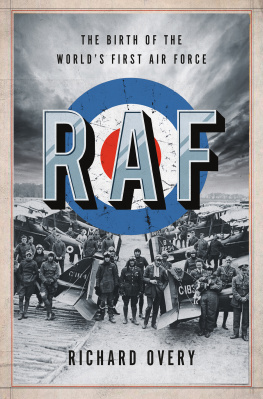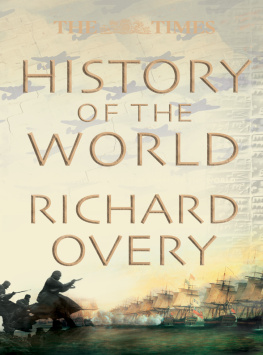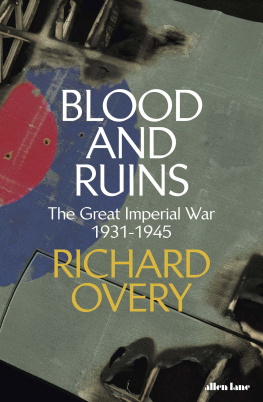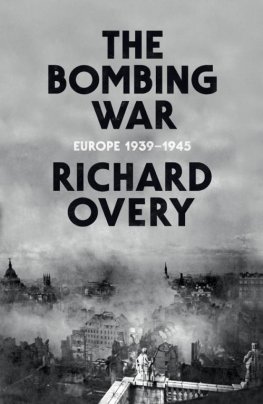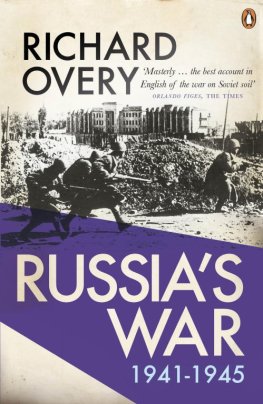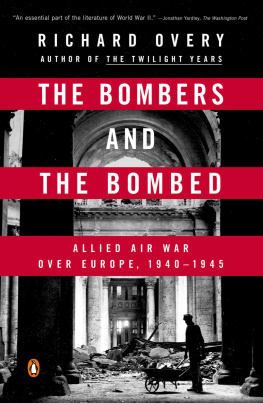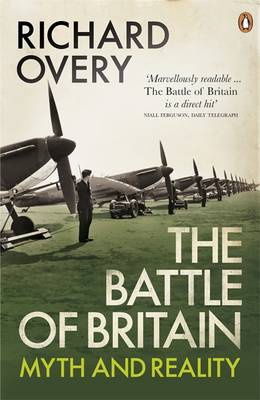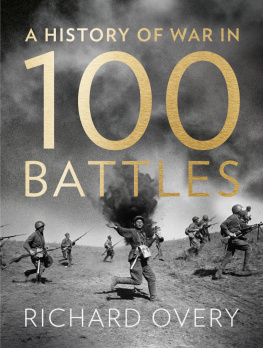Contents
About the Author
Richard Overy is Professor of History at the University of Exeter. He is the author of many books on the Second World War and the Third Reich including Russias War (1998), The Battle of Britain (2000) and Interrogations: The Nazi Elite in Allied Hands, 1945 (2001). His latest book The Dictators: Hitlers Germany, Stalins Russia (2004) was joint winner of the Wolfson Prize and the Hessel-Tiltman Prize in 2005. He is a Fellow of the British Academy and a Fellow of Kings College, where he taught for twenty-five years. He is currently writing a book on inter-war cultures of decline.
Illustrations
A 1941 cartoon portrays Hitler devouring one country after another.
A US Dauntless dive-bomber during the Battle of Midway.
A sinking Japanese merchant ship seen through the periscope of a US submarine.
An American propaganda poster urges revenge for Pearl Harbor.
German soldiers cross the Don river in July 1942.
A column of Soviet T-34 medium tanks.
The Soviet SU -76 self-propelled gun during the advance into Prussia in 1945.
The Stalingrad cauldron ablaze at night under air and artillery fire.
A German truck protected against the fierce Russian climate.
British propaganda exaggerates the effectiveness of British bombing.
A bombers view of the attack on Hamburg, July 1943.
Anti-aircraft guns on the German Kammhuber Line.
German dead from a raid on Berlin in December 1943.
Sailors of the Indian navy visit the ruins of Hiroshima in 1945.
Allied soldiers storm the Normandy beaches, 6 June 1944.
A group of British artillerymen face the German front at Caen.
An artificial port, or Mulberry, off the Normandy coast, June 1944.
View of an American shipyard, mass-producing Liberty ships.
Steel furnaces at Magnitogorsk in the Urals.
The assembly line at Willow Run, Michigan.
German soldiers, horses and wagons on the Soviet front, summer 1942.
Japanese soldiers train in archery as preparation for modern combat.
A nuclear bomb of the type used against Nagasaki, nicknamed Fat Man.
The three Allied leaders at the first summit talks in Teheran.
British and American military chiefs at the Quebec conference, October 1943.
Pope Pius XII broadcasts to Washington in the winter of 1939.
German officers execute Soviet peasants on the eastern front.
Allied propaganda presents the Japanese as primitive racial inferiors.
A Soviet cartoon encourages the reader to see the enemy in animal terms.
A Soviet poster identifies the Great Patriotic War with past Russian victories.
A German propaganda poster plays on popular fears of Bolshevism, late in the war.
Maps
Axis expansion in Europe 193842
Japanese expansion 193142
Battle of the Coral Sea, 57 May 1942
Battle of Midway, 45 June 1942
Merchant ships sunk from 1 August 1942 to 21 May 1943
Merchant ships sunk from 22 May 1943 to 31 December 1943
The Eastern Front 194142
Battle of Stalingrad, September 1942 to January 1943
Battle of Kursk, JulyAugust 1943 113
Battle for Normandy, 6 June to 24 July 1944
Breakout and pursuit in France, JulyAugust 1944 210
WHY THE ALLIES WON
RICHARD OVERY
Preface to the Second Edition
IT IS NOW almost twelve years since the first edition of Why the Allies Won was written. In the interval a great deal of additional material has been published and new perspectives opened up on the history of the Second World War. Some touch on the questions raised here, but others have opened up fresh avenues of approach to the issue of war as a cultural or social phenomenon rather than on the issues of war-making and strategic choice with which explanations of victory and defeat are bound up. In most respects the arguments about this narrower question of Allied victory stand or fall today in much the same way as they did a decade ago. As a result it has not seemed necessary to write a different book, but instead primarily to take the opportunity to correct mistakes and make clearer what was not clear in the earlier version.
There is one area, however, where the historiography and the base of evidence are changing very rapidly. The history of the Soviet war effort has been the beneficiary of a decade of close research, which has not altered the basic shape of the narrative but has deepened understanding about the big issues raised and modified or overturned versions of events that seemed standard in 1995. The major question how did the Red Army succeed in holding back and then defeating the overwhelming bulk of the German armed forces now has fuller answers than it once had. The research on detailed aspects of the reform of Soviet military practice and thinking during the war has shown conclusively that mere numbers did not suffice to explain the difference between the two sides. The sheer depth of Soviet preparation for war, for all its drawbacks and miscalculations, has been shown to be more wide-ranging and significant than was once thought, thanks to the work of Lennard Samuelson and David Glantz. For all the catastrophic losses of 1941, the Soviet Union was never starting from ground zero in its attempts to rebuild its armed and economic strength in 1942 and 1943. The vexed question of Lend-Lease, about which a generation of Soviet scholars were so deprecating, has now been transformed by the evidence that the Soviet leadership understood very well how vital these resources were in a context where their rump economy could not produce both armaments and the raw materials and equipment necessary to sustain the war effort. Finally the whole idea that the Soviet side sought an armistice or separate peace in 1941 and again in 1943 has been shown to be without the serious foundation attributed to it a decade ago.
On the wider arguments about the reasons behind Allied victory there will always be disagreement. Why the Allies Won did not differ from much of the literature of the early 1990s in emphasising just how important the Soviet contribution was. Perhaps in reaction to the predominantly Soviet-centred analysis of the outcome, there has been a drift back to a more balanced view. The impact of bombing, for example, though the subject of increasing moral condemnation has come to be regarded as more significant in limiting German (and Italian and Japanese) options than was once thought. It is worthwhile here to make clear, since it has been a subject of some confusion in the arguments surrounding the book, that explaining the role of bombing in the defeat of Germany is not the same as endorsing the legitimacy of the campaign. There were pressing military and political reasons which explain the British and American choice, but the consequent death, disablement and dispossession of millions of civilians, was not in any sense consistent with the liberal values of the two states that embarked on the campaign or with their pre-conflict view of what was and what was not permissible in international law. Mass civilian deaths are not something of which anyone could approve or feel morally indifferent towards; but it is necessary in this context to understand the nature of the impact that such bombardment produced.
There were two areas in the book where I displayed a woeful failure to grasp the technical and scientific complexity of what I was describing. The first was in the naval war, the second in the development of nuclear weapons and technology. I am very grateful for the advice I received on both areas, on whose basis I have made the necessary changes. The details tend to strengthen rather than weaken the overall thrust of the argument, but the details are important, particularly as so much of the discussion hinges on small but significant improvements in tactics and weaponry, which still tend to be underestimated in analysis of military conflict.


